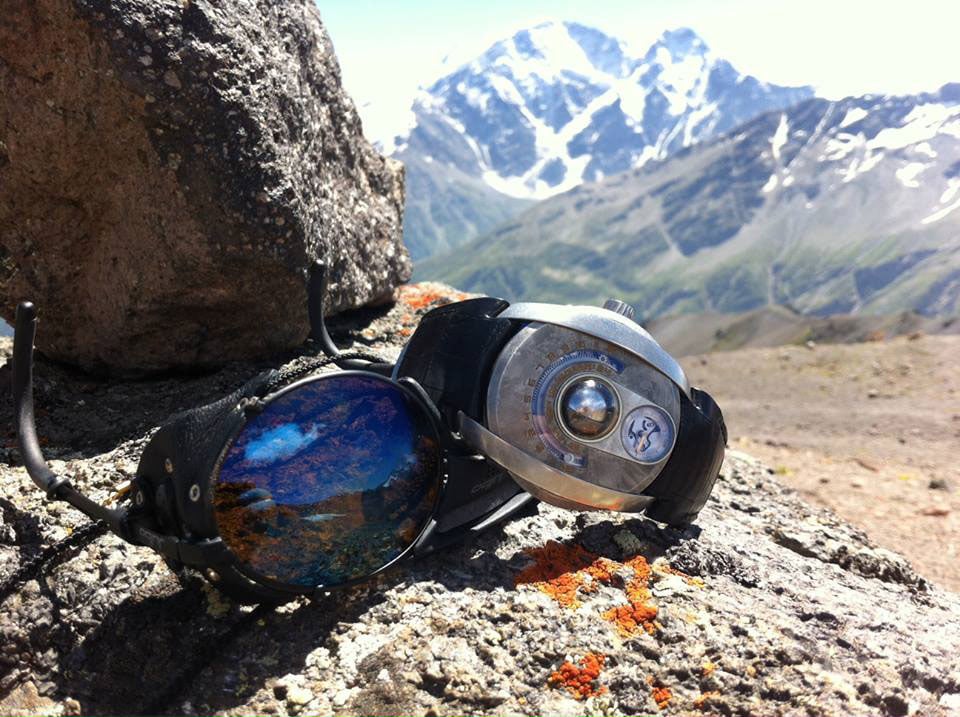Weekly Watch Photo – Konstantin Chaykin Lunokhod

We don’t know where Konstantin Chaykin went for vacation, but it looks like he went to some sort of futuristic moon landscape. Well, the result is befitting for photos of the Lunokhod. For this timepiece is a tribute to the Sovjet Union’s moon-walkers, called the Lunokhod!
The center of Lunokhod’s dial gives stage to a 12-millimetre copy of the moon, where it stands motionless. Slowly revolving around the moon, is a silver half-sphere that reproduces the Earth’s shadow. The orbital period is 29 days, 15 hours, 44 minutes and 2.8 seconds, making this an extremely precise moon phase indication, and also the world’s most realistic moon-phase display on a watch dial. That is because this moon phase indication actually mimics the Earth’s shadow on the moon, which is exactly what we can see from earth.

The timepiece’s calibre was designed and created in-house. While this watch looks quite imposing, the sensation of its magnitude fades away as soon as you turn it over and realise that its case is just 10.7 mm thick.
Lunokhod Programme
Lunokhod (Russian: Луноход, “Moonwalker”) was a series of Soviet robotic lunar rovers designed to land on the Moon between 1969 and 1977. Created by Soviet scientists, the Lunokhod was the first ever remote-controlled rover to operate successfully on the surface of another celestial body. On 17 November 1970, “Lunokhod 1” was carried to the moon by the automatic interplanetary spacecraft “Luna-17” and deposited in the Sea of Rains. The space rover operated on the surface of the moon from 17 November 1970 to 4 October 1971 and studied 80,000 square meters of lunar surface, traveling 10.54 km.
The 1969 Lunokhod 1A was destroyed during launch, the 1970 Lunokhod 1 and the 1973 Lunokhod 2 landed on the moon and the 1977 Lunokhod was never launched.
The miniature moon made of so-called Wootz steel that has a complex structure that recalls the moon’s surface, dotted with craters. The spherical moon-phase indicator is made of silver and covered with black rhodium. The Wootz steel used to craft the case and miniature moon was smelted by wootz-steel expert Sergei Luniov, one of Russia’s best smiths and gunmakers. Wootz steel is a particularly strong material that has been used to make swords, daggers and other weapons for centuries.
And while the Lunokhod features a moon in Wootz-steel, the Lunokhod Prime (see below) features a large pearl from the South Seas, which plays the role of the miniature moon.

The Lunokhod features a retrograde hour indication, arched around the spherical moon, and a retrograde minutes display is located in the lower part of the dial. The transparent case back is made of sapphire crystal and the case of Wootz-steel or 18-carat gold for the Lunokhod Prime. The movement comprises 346 parts, including 37 jewels, and boosts a power reserve of 48 hours.
Looking at the photos, it seems that Konstantin Chaykin didn’t go to the moon for these photos, but instead went hiking in the Swiss mountains.
More information on the Konstantin Chaykin website.








